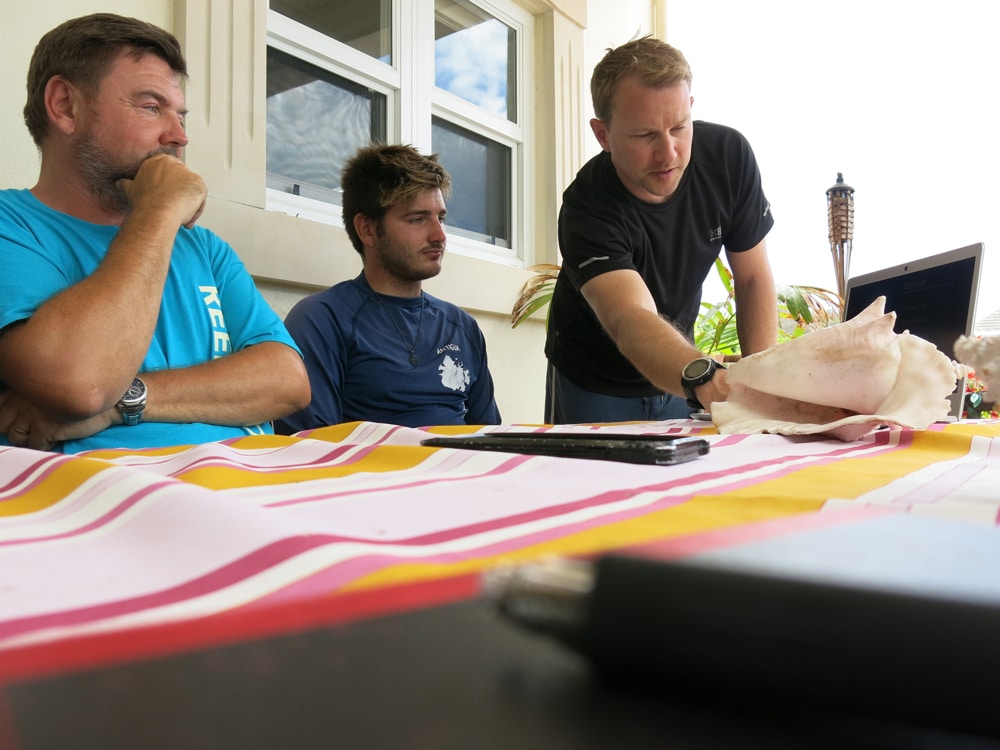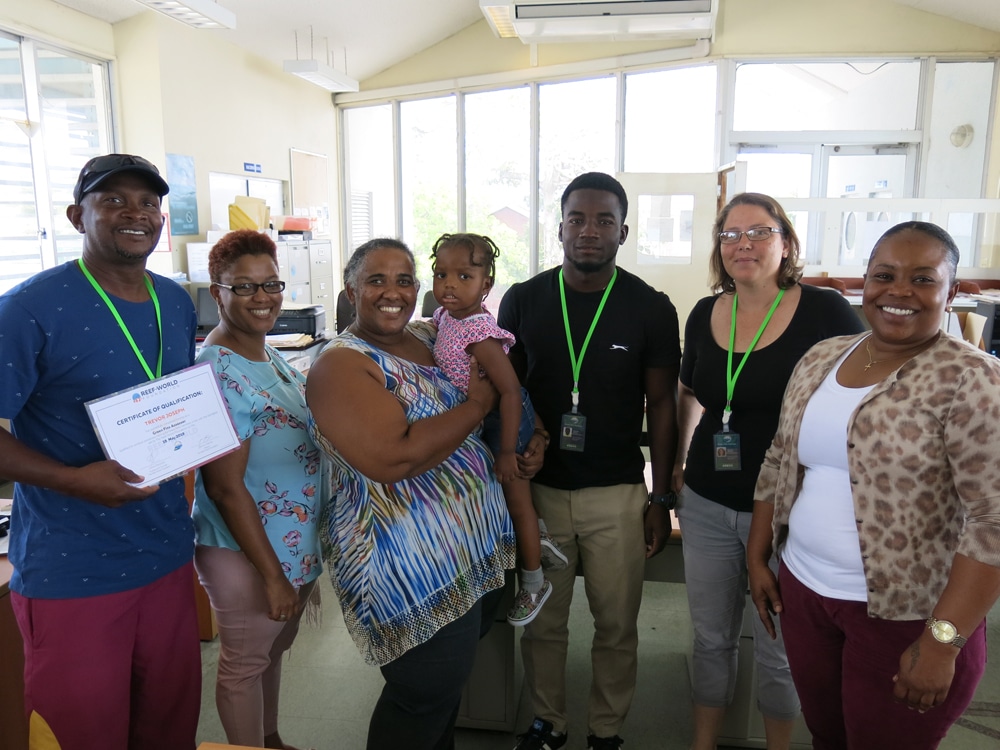Marine Life & Conservation
Antigua & Barbuda Implements Environmental Standards for Diving & Snorkelling
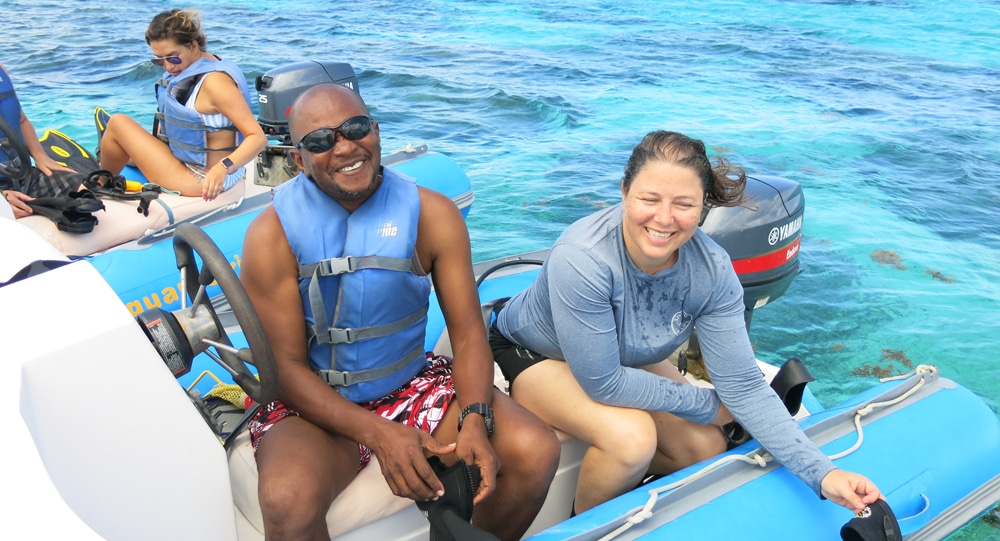
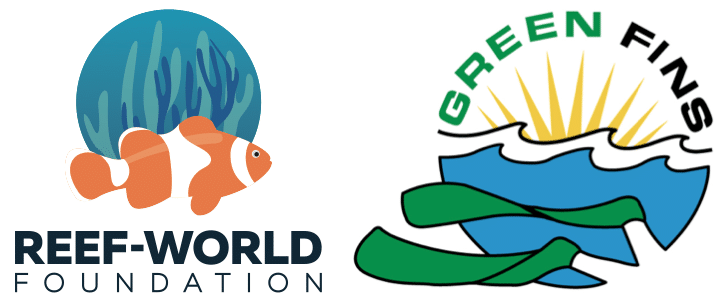 The Green Fins initiative hopes to reach 10,000 tourists in the next year.
The Green Fins initiative hopes to reach 10,000 tourists in the next year.
The Reef-World Foundation – the international coordinators of Green Fins – is pleased to announce Antigua and Barbuda has become the first English speaking country in the western hemisphere to implement the Green Fins initiative. The country is the 10th government worldwide to officially adopt Green Fins and the second in the Caribbean.
Green Fins is a UN Environment initiative, internationally coordinated by The Reef-World Foundation, which aims to protect and conserve coral reefs through environmentally-friendly guidelines to promote a sustainable diving and snorkelling tourism industry.
Antigua and Barbuda, which has a population of just 100,000, received 285,000 overnight visitors and 1,000,000 cruise ship tourists in 2018. It is estimated there are over 30 businesses which provide either snorkelling or diving activities to these tourists. Reef-World hopes the initiative will significantly reduce the environmental impact on coral reefs by reaching 10,000 tourists in the next year.
The country now has a national team of 2 senior Green Fins Network leaders, 3 Green Fins assessors and 3 dive schools joining the global network of more than 560 trained and assessed Green Fins member dive and snorkel operators. Following a week of training by Reef-World, a national team comprised of the Ministry of Tourism and the Fisheries Division are now certified to recruit, train and conduct assessments of new Green Fins members in the country. This involves providing training about the ecology and threats to coral reefs, simple and local everyday solutions to these threats and Green Fins’ environmental standards to dive and snorkel operators.
The newly trained Green Fins Assessors will be carrying out robust assessments to evaluate the environmental impact of dive and snorkel operators and providing one-to-one consultation to help the business develop and implement best practice to improve the sustainability of the marine tourism industry. The individual feedback and support provided – which includes practical, low-cost alternatives to common threats to the marine environment such as anchoring, provision of single use plastics such as plastic bottles and lack of awareness to existing rules and regulations – is based on each company’s area of highest negative impact on the reef, as determined by the assessment.
Green Fins provides the only internationally recognised environmental standards for the diving and snorkelling industry and has a robust assessment system to measure compliance. Reducing diving and snorkelling-related damage to sensitive marine ecosystems, including coral reefs, helps to make them more resilient to other local and wider stressors, such as over fishing or run-off from land containing pollutants and plastic debris as well the impacts from climate change, such as rising sea temperatures.
The newly qualified Green Fins assessors, who are now certified to conduct assessments of Green Fins dive centres in Antigua and Barbuda, are Trevor Joseph – Fisheries Division, Sophia Steele – Environmental Awareness Group / Fauna and Flora International and Akeem Daley – Ministry of Tourism. The dive operators who have already been trained and certified by the Green Fins initiative are: Antigua Reef Riders, Dive Carib and Jolly Dive. There has also been significant interest from other operators who have signed the Membership form and are looking forward to their training and assessment.
The implementation of Green Fins in Antigua and Barbuda was made possible through a partnership with the ethical cosmetic company Caudalie, facilitated by the 1% for the Planet movement. In addition to Caudalie helping the environment by dedicating 1% of its global sales to funding reforestation projects, the company has recently released a new reef-safe sunscreen range. By creating a range of sun care products which do not include the harmful chemicals Oxybenzone and Octinoxate, Caudalie is helping to increase the resilience of coral in areas of high tourism.
JJ Harvey, Director at The Reef-World Foundation, said: “We’re delighted to have received the funding from Caudalie that now allows us to implement Green Fins in Antigua and Barbuda and ensure the sustainability of both the programme and the marine tourism industry. Tourism has been growing steadily for several years and the government has shown a strong desire to pro-actively protect the country’s coral reefs and marine life through the implementation of Green Fins’ best practices and standards. This funding that now makes expansion into Antigua and Barbuda possible will not only significantly improve the diving and snorkelling industry’s conservation impact in the region but is also a huge step in the global expansion of the Green Fins network.”
Hon. Charles Fernandez, Antigua and Barbuda’s Minister for Tourism and Economic Development, said: “This is a tremendous opportunity. I really applaud the initiative. I congratulate the fisheries department for collaborating with us. It is very important for tourism but even more it is important for us as a people.”
Vashti Casimir, Antigua and Barbuda’s Senior Tourism Officer Responsible for Sustainable Tourism, added: “We’re hoping that through this programme we’ll have more diving and snorkelling businesses coming on board to ensure the practices across that industry remain environmentally friendly.”
Tricia Lovell, Deputy Chief Fisheries Officer at the Fisheries Division, said: “We recognise our coral reefs are under a myriad of threats; not just from use but also from larger issues like climate change and so we figured it would be best to look at ways of improving the way we use the system. This week is just the start and a lot can come out of it and benefit the marine environment.”
The funding to implement Green Fins in Antigua and Barbuda has been provided by the French cosmetic company Caudalie. The company has recently partnered with Reef-World through the 1% for the Planet movement thanks to consultative advice Caudalie received from PUR Project.
For more information, please visit www.reef-world.org or www.greenfins.net.
Marine Life & Conservation
Leading UK-based shark conservation charity, the Shark Trust, is delighted to announce tour operator Diverse Travel as a Corporate Patron

 Corporate Patrons provide a valuable boost to the work of The Shark Trust. The Trust team works globally to safeguard the future of sharks, and their close cousins, the skates and rays, engaging with a global network of scientists, policymakers, conservation professionals, businesses and supporters to further shark conservation.
Corporate Patrons provide a valuable boost to the work of The Shark Trust. The Trust team works globally to safeguard the future of sharks, and their close cousins, the skates and rays, engaging with a global network of scientists, policymakers, conservation professionals, businesses and supporters to further shark conservation.
Specialist tour operator Diverse Travel has operated since 2014 and is committed to offering its guests high quality, sustainable scuba diving holidays worldwide. Working together with the Shark Trust will enable both organisations to widen engagement and encourage divers and snorkellers to actively get involved in shark conservation.
“Sharks are truly at the heart of every diver and at Diverse Travel, we absolutely share that passion. There is nothing like seeing a shark in the wild – it’s a moment that stays with you forever!” says Holly Bredin, Sales & Marketing Manager, Diverse Travel.
“We’re delighted to celebrate our 10th year of business by becoming a Corporate Patron of the Shark Trust. This is an exciting partnership for Diverse and our guests. We will be donating on behalf of every person who books a holiday with us to contribute towards their vital shark conservation initiatives around the world. We will also be working together with the Trust to inspire divers, snorkellers and other travellers to take an active role – at home and abroad – in citizen science projects and other activities.”
Paul Cox, CEO of The Shark Trust, said:
“It’s an exciting partnership and we’re thrilled to be working with Diverse Travel to enable more divers and travellers to get involved with sharks and shark conservation. Sharks face considerable conservation challenges but, through collaboration and collective action, we can secure a brighter future for sharks and their ocean home. This new partnership takes us one more valuable step towards that goal.”
For more information about the Shark Trust visit their website here.
For more about Diverse Travel click here.
Marine Life & Conservation
Shark Trust Asks Divers to help with Shark Sightings this Global Citizen Science Month

 Whether you are stuck for ideas of what to do with the kids or are off on the dive trip of your dreams. You can get involved in Citizen Science Month and help the Shark Trust by providing vital data about sharks are rays both close to home and further afield.
Whether you are stuck for ideas of what to do with the kids or are off on the dive trip of your dreams. You can get involved in Citizen Science Month and help the Shark Trust by providing vital data about sharks are rays both close to home and further afield.
In addition to reporting the sharks and rays you see on your dives, the eggcases you find on the beach, the Shark Trust is looking for some specific data from divers who are asked to report any Oceanic Whitetip and Basking Sharks.
Oceanic Whitetip Sharks
The Shark Trust are looking specifically for Oceanic Whitetip Shark sightings over the coming weeks and months. So, if you are diving anywhere in the world, please report your sightings via the website or app.
Website: https://recording.sharktrust.org/
App: Search The Shark Trust in your app store
The Oceanic Whitetip. Known for their incredibly long dorsal and pectoral fins, this species was once the most abundant oceanic-pelagic species of shark on the planet.
Large and stocky, they are grey or brown above, and white below and famous for their huge rounded first dorsal fin and paddle-like pectoral fins. The fins also highly prized within the shark fin trade. Whilst they are mostly solitary, Oceanic Whitetips do occasionally hunt in groups.
An inquisitive species, they were easy prey for fisheries. Combined with their low reproductive rate, they were inevitably at high risk of population depletion. And declines of up to 99% have been reported in certain sea areas. They are listed as Critically Endangered on the IUCN Redlist (2019).
Conservation efforts to discourage further declines include listing on CITES Appendix II and CMS Appendix I. They’re also the only species prohibited from take by all the Tuna RFMOs (Regional Fisheries Management Organisations). However, these measures do not mean that Oceanic Whitetips are not still caught – whether targeted or as bycatch – in some parts of the world. With populations declining at such a high rate, effective implementation of management measures is essential to ensure that the species can recover.
If you are lucky enough to get an image of an Oceanic Whitetip and you record your sighting on the Shark Trust app or website YOU CAN WIN! All images submitted with sightings, that also give consent to use in conservation messaging, will be in with a chance to win an Oceanic Whitetip T-shirt and mug. The competition will run until the end of “Shark Month” in July – so keep those sightings (and images) coming in.
Basking Sharks
Basking Shark (Cetorhinus maximus) season is upon us, and the Shark Trust is asking everyone to keep an eye out for these majestic giants over the summer months. If you see any, you can record your sighting to the Basking Shark Sightings database.
Each year, these mighty fish return to British waters to feed on plankton. You may see one, (or a few if you’re really lucky) from around April-October. They can be seen feeding at the surface of the water, where they look like they’re basking in the sun. Thus, their name!
Sighting hotspots around the British Isles include southwest England, Isle of Man, north coast of Ireland, and western Scotland. The Sea of the Hebrides is the most prolific sightings area in Scotland, but they have been spotted all around the coast and have even ventured into some of the sea lochs. The Shark Trust has received thousands of sightings since the Basking Shark project began, but more data is needed to truly understand what is going on with population numbers and distribution. You can help by recording your sightings this summer.
Great Eggcase Hunt
The Shark Trust has an Easter Egg Hunt with a difference for you to try. Take part in the Great Eggcase Hunt and get involved with a big citizen science project that helps shark, ray and skate conservation. And it’s an enjoyable activity for all the family.
The Shark Trust also want snorkellers and divers to record their underwater eggcase findings. Underwater records help pinpoint exactly where sharks and skates are laying their eggs and can help link to beach records. Learning the depth and substrate that they lay on also helps better understand the species.
Find out more: https://www.sharktrust.org/great-eggcase-hunt
Whether you are diving, snorkelling or exploring on the beach you can take part in Citizen Science Month and get actively involved in shark and ray conservation. Find out more: www.sharktrust.org
-

 News3 months ago
News3 months agoHone your underwater photography skills with Alphamarine Photography at Red Sea Diving Safari in March
-

 News2 months ago
News2 months agoCapturing Critters in Lembeh Underwater Photography Workshop 2024: Event Roundup
-

 Marine Life & Conservation Blogs2 months ago
Marine Life & Conservation Blogs2 months agoCreature Feature: Swell Sharks
-

 Blogs1 month ago
Blogs1 month agoMurex Resorts: Passport to Paradise!
-

 Gear News3 months ago
Gear News3 months agoBare X-Mission Drysuit: Ideal for Both Technical and Recreational Divers
-

 Blogs2 months ago
Blogs2 months agoDiver Discovering Whale Skeletons Beneath Ice Judged World’s Best Underwater Photograph
-

 Gear Reviews2 months ago
Gear Reviews2 months agoGear Review: Oceanic+ Dive Housing for iPhone
-
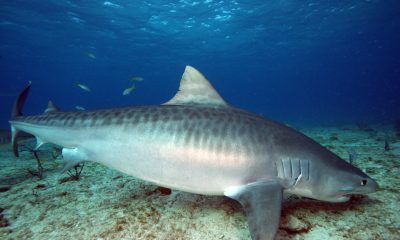
 Blogs3 months ago
Blogs3 months agoThe Thrilling Encounter with Tiger Sharks at Beqa Lagoon’s ‘The Colosseum’ with Coral Coast Divers


